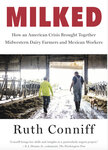

MADISON, Wis. — A confluence of necessity and shared values forms the material of a new book titled “Milked: How an American Crisis Brought Together Midwestern Dairy Farmers and Mexican Workers.”
“Milked,” which was published in 2022, was written by Ruth Conniff. Conniff is a journalist and current editor in chief for the Wisconsin Examiner of Madison.
“This story really shows how farmers in this country and the agricultural workers from Mexico are really in the same boat,” Conniff said. “They’re basically two groups of rural people who are under pressure from the same global economic forces.”
The main economic force Conniff refers to is the pressure for farms to expand in order to stay economically viable.
“(North American Free Trade Agreement) and other global trade agreements … really helped propel the get-big-or-get-out trend in agriculture and forced farmers to expand their operations very quickly and hire workers for the first time,” Conniff said. “That same phenomenon also pushed a lot of subsistence-level Mexican farmers off of their land and sent them north looking for jobs.”
Friendships formed between the bosses working side by side with their employees. Conniff said the farmers and workers found they both had agrarian backgrounds, enjoyed working with animals and had cultural similarities.
“The thing that these farmers and these rural workers from Mexico found in common is this kind of optimistic can-do attitude,” Conniff said. “That’s what drives them, and they’re making it work in these really difficult conditions.”
Conniff said qualities often considered American are actually shared with Mexico.
“They are hardworking, uncomplaining, keep their heads down and have amazing, incredible dedication to their families,” she said.
The book uses personal narratives to move its points forward, switching between the stories of undocumented Mexican immigrant dairy farm workers and their Wisconsin employers.
Topics approached include immigration policy, political leanings, pressure to expand, the idea of economically sustainable farms, racism and local food, all through the lens of the individual people who populate these interconnected themes.
“I felt like that structure of telling these individual personal life stories of farmers on this side of the border and workers from that side of the border ... was an interesting way to shed light on something that’s a big policy issue, but it’s really in the end about individual people,” Conniff said.
Conniff first was inspired to write the book in 2018 after reading an article about a family of undocumented dairy farm workers packing up and going back to Mexico because of fear of deportation and being separated from their children.
At the time, Conniff was preparing to move to Mexico with her family. She got in touch with the family from the article and visited them in Mexico.
Conniff said their story, which she includes in the book, illustrates how many Mexican workers come to the U.S. to work in order to send money home.
“They kind of personalize the story of circular migration — of not having an American dream, (but of) having a Mexican dream and saving money in this country to pay for that,” Conniff said.
Conniff spent the next several years interviewing farmers and their immigrant workers. She connected with many of the people in her book through an organization called Puentes/ Bridges Inc., which helps to connect farmers with the culture of their workers by taking trips to Mexico to visit the families of their employees.
One of the stories Conniff shares in the book is about Roberto and John. Roberto was born in Mexico, and he remembered as a child being in their shack house during a storm with hail coming through the tarp roof. Roberto promised his mom he would build her a better house someday.
John is the dairy farmer in Wisconsin who hired Roberto. Roberto worked for him for over 10 years, and they became close friends and would go golfing together. When Roberto decided to return to Mexico, Conniff said it was a blow to John. John has no children and has a dream of passing on his farm to his employees.
“He really sees them as this next wave of immigrants who will run dairy farms in the area,” Conniff said.
Conniff said she hopes the book will help dispel the stereotype that Mexican workers are a drag on the communities where they work. To illustrate, she tells the story of the town of Arcadia, which she includes in the book.
“They are opening up businesses on Main Street; they’re revitalizing the town,” Conniff said. “In some ways, this is the next wave of immigrants from the historical perspective of waves of immigration.”
Arcadia’s school district is 75% Hispanic or Latino, Conniff said.
Conniff said that when people develop connections with people on an individual level, they move past stereotypes and negative political rhetoric.
Within the book, Conniff advocates for advancing smaller, yet still economically viable farms and stresses the importance and security of having regional food economies.
“The idea that people are getting chewed up as well as resources is clear to a younger generation of Americans,” Conniff said. “There’s some hope for more rational economic policy out of that.”
Comments
No comments on this item Please log in to comment by clicking here